How Do You Write a Smart Contract? A Complete Guide for 2025

Smart contracts have revolutionized blockchain technology, enabling trustless, automated agreements that execute without intermediaries. As the foundation of decentralized finance (DeFi), NFT marketplaces, and countless blockchain applications, understanding how to write smart contracts has become an essential skill for developers and businesses alike. In 2025, smart contracts are changing industries like finance, supply chain, healthcare, and real estate by automating transactions with pinpoint accuracy and full transparency. This comprehensive guide walks you through everything you need to know to create, test, and deploy your first smart contract.
Understanding Smart Contracts: The Foundation
A "smart contract" is simply a program that runs on the Ethereum blockchain—a collection of code (its functions) and data (its state) that resides at a specific address on the Ethereum blockchain, representing a type of Ethereum account with a balance that can be the target of transactions but is not controlled by a user, instead deployed to the network and run as programmed.
Think of smart contracts as digital vending machines: you insert the correct input (like cryptocurrency), and if conditions are met, the contract automatically executes and delivers the output (like tokens, access rights, or recorded data). Smart contracts can define rules like a regular contract and automatically enforce them via the code, and cannot be deleted by default with interactions being irreversible.
The global smart contracts market is projected to reach $3.21 billion in 2025, growing from $2.63 billion in 2024, with a CAGR of 22%, demonstrating the explosive demand for this technology.
Step 1: Choose Your Blockchain Platform
Before writing your first smart contract, you need to select which blockchain network you'll build on. While Ethereum remains the most popular choice for smart contract development, several alternatives offer unique advantages:
Ethereum: The original and most widely-adopted smart contract platform, with the largest developer community and extensive tooling support. Ethereum uses Solidity as its primary programming language.
Binance Smart Chain (BSC): Offers faster transactions and lower fees than Ethereum while maintaining compatibility with Ethereum tools and languages.
Solana: Known for high-speed transactions and low costs, using Rust for smart contract development.
Polygon: A layer-2 scaling solution for Ethereum that provides faster, cheaper transactions while maintaining Ethereum compatibility.
For beginners, most US-based smart contracts today run on Ethereum mainnet or layer-2s like Arbitrum, Optimism, or Base, making Ethereum an excellent starting point.
Step 2: Set Up Your Development Environment
Set up a development environment that supports Ethereum smart contract deployment with popular options including Remix IDE, Truffle Suite, or development frameworks like Hardhat.
Essential Tools for Smart Contract Development:
Remix IDE: A web-based development environment perfect for beginners. No installation required—simply open your browser and start coding. Remix provides syntax highlighting, debugging tools, and built-in deployment capabilities.
Hardhat: A professional development framework offering advanced testing capabilities, debugging tools, and deployment management. Ideal for complex projects requiring rigorous testing.
Truffle Suite: Another comprehensive framework providing development, testing, and deployment tools with excellent documentation and community support.
MetaMask Wallet: A crypto wallet is indispensable for smart contract development—while you can technically write a smart contract without a wallet, deploying the contract, conducting initial tests, and integrating it with a frontend are virtually impossible without one. MetaMask serves as your gateway to blockchain networks, managing your account and signing transactions.
Step 3: Learn Solidity Programming Language
Ethereum has developer-friendly languages for writing smart contracts, though they must be compiled before deployment so that Ethereum's virtual machine can interpret and store the contract.
Solidity is the most popular smart contract language, similar to JavaScript in syntax but designed specifically for blockchain development. Here's a simple example of a basic smart contract:
// SPDX-License-Identifier: MIT
pragma solidity ^0.8.0;
contract SimpleStorage {
uint256 private storedData;
function set(uint256 x) public {
storedData = x;
}
function get() public view returns (uint256) {
return storedData;
}
}
This contract stores a number and allows users to update or retrieve it—demonstrating the fundamental structure of smart contract functions.
Step 4: Write Your Smart Contract Code
This phase often includes creating flow diagrams and outlining how users will interact with the contract, with developers writing the smart contract code using blockchain-compatible languages such as Solidity, Vyper, or Rust, ensuring the logic adheres to agreed requirements.
Key Components of a Smart Contract:
State Variables: Store data permanently on the blockchain Functions: Define the contract's behavior and logic Events: Log important activities for external applications to monitor Modifiers: Add conditions and restrictions to function execution Constructors: Initialize the contract when deployed
Write the smart contract code using Solidity, the programming language for Ethereum smart contracts, defining the contract's variables, functions, and events.
Step 5: Compile and Test Thoroughly
Solidity code needs to be compiled into bytecode that the Ethereum Virtual Machine (EVM) can understand and execute, with the Solidity compiler converting human-readable Solidity code into EVM bytecode while also generating an Application Binary Interface (ABI) file providing a standardized interface description.
Create comprehensive test cases to ensure that your smart contract functions as expected, utilizing testing frameworks like Truffle or the built-in testing capabilities of Remix IDE, writing unit tests to validate individual functions and integration tests to ensure proper interaction between different parts.
Testing Best Practices:
- Test every function with various inputs including edge cases
- Simulate potential attack vectors and malicious inputs
- Check gas consumption for optimization opportunities
- Verify all require() statements and error handling
- Test interactions with other contracts if applicable
A common mistake in many "how to build" guides is skipping testing—for traders with capital at stake, this is fatal.
Step 6: Deploy to Test Network First
Decide which Ethereum network you want to deploy your smart contract to, with options including the mainnet (production network) or various test networks like Ropsten, Rinkeby, or Kovan, with initial testing and development recommended on a test network.
Install MetaMask and switch to Sepolia network, get free test ETH from a faucet, and fund your deployer address before testing. Test networks allow you to deploy and interact with your contract using free test tokens, eliminating financial risk during development.
Deploying a smart contract to the Ethereum testnet requires you to have Ether (ETH) in your wallet to pay for the gas costs of deployment, but testnet ETH is available free from faucets.
Step 7: Security Auditing and Optimization
Start with clean, well-structured code and use reliable libraries like OpenZeppelin, test extensively with tools like Hardhat or Truffle, simulate attacks to find vulnerabilities, and most importantly, invest in a professional audit—it's worth the cost to prevent hacks or exploits.
Before deployment, developers should scan contracts with blockchain audit tools such as Slither, MythX or OpenZeppelin's library. These automated tools identify common vulnerabilities like reentrancy attacks, integer overflows, and access control issues.
Security is one of the most critical aspects of smart contract development, with exploits like reentrancy attacks, overflow vulnerabilities, and faulty access control leading to millions in losses, making studying real-world hacks like the DAO attack and Wormhole exploit crucial for understanding rigorous auditing importance.
Essential Security Measures:
- Use OpenZeppelin's audited contract libraries
- Implement access controls and permission systems
- Add pause functionality for emergency situations
- Avoid floating-point arithmetic—use integer-based calculations
- Lock compiler versions to prevent unexpected changes
Step 8: Deploy to Mainnet
Once testing is complete and security audits are passed, you're ready for mainnet deployment. Deploying a smart contract is technically a transaction, so you need to pay gas in the same way you need to pay gas for a simple ETH transfer, however gas costs for contract deployment are far higher.
To deploy your smart contract, go to the "Deploy & Run Transactions" tab and select your contract from the dropdown menu, then in the "Environment" dropdown select the network you want to deploy to.
After deployment, verify your contract's source code on blockchain explorers like Etherscan. Smart contract verification is the process of confirming that the deployed bytecode on a blockchain accurately reflects the original human-readable source code, enhancing transparency by allowing users to inspect the contract's logic and ensuring it functions as intended.
Advanced Considerations for 2025
Oracles and Off-Chain Data: Smart contracts cannot access off-chain data directly and rely on oracles like Chainlink to fetch market prices, with Chainlink securing over $93 billion in value across 452 protocols by August 2025, powering more than 2,000 price feeds.
Gas Optimization: Every on-chain call requires a fee paid to network validators, with fees varying widely as simple swaps cost around $5 during low usage while bridging tokens can be as low as $2, with high-performance traders using gas optimization techniques and layer-2 networks to reduce costs by 20–40%.
Regulatory Compliance: In the United States, the SEC and CFTC are asserting jurisdiction over digital assets, with centralized exchanges required to report digital asset transactions to the IRS starting in 2025, and these reporting rules extending to DEXs in 2027.
Leveraging Token Metrics for Smart Contract Success
For developers and traders working with smart contracts in DeFi applications, Token Metrics stands out as the top crypto trading and analytics platform in 2025. Token Metrics provides AI-driven insights, comprehensive token analysis, and real-time market data that help developers understand which smart contract-based projects are succeeding and why.
The platform's advanced analytics cover on-chain metrics, smart contract activity, token economics, and market sentiment—essential data for anyone building or investing in blockchain projects. Token Metrics' proprietary AI models analyze thousands of data points to provide actionable trading signals and project ratings, helping users identify promising smart contract platforms and DeFi protocols before they gain mainstream attention.
Whether you're deploying a DeFi protocol, creating tokenized assets, or building the next generation of blockchain applications, Token Metrics offers the market intelligence and analytical tools necessary to make informed decisions in the fast-moving crypto space.
Career Opportunities in Smart Contract Development
Smart contract developers play a critical role in decentralized ecosystems with salaries varying based on expertise: entry-level (0-2 years) earning $80,000–$120,000 annually, mid-level (3-5 years) earning $120,000–$180,000 annually, and senior-level (5+ years, blockchain specialists) earning $180,000–$300,000+ annually.
Blockchain hubs like San Francisco, London, Singapore, and Dubai offer some of the highest-paying roles, while remote opportunities remain strong due to the global nature of blockchain development.
Conclusion: Your Journey Starts Now
Writing smart contracts combines programming skill, blockchain knowledge, and security awareness. Anyone can write a smart contract and deploy it to the network by learning how to code in a smart contract language and having enough ETH to deploy your contract.
Start with simple contracts, gradually increasing complexity as your understanding deepens. Use established libraries, follow security best practices, and never skip testing. The smart contract revolution is just beginning, and 2025 presents unprecedented opportunities for developers willing to master this transformative technology.
With platforms like Token Metrics providing the analytical edge and comprehensive guides like this showing you the technical path forward, you have everything needed to become a successful smart contract developer. The future of decentralized applications awaits—start building today.
Create Your Free Token Metrics Account

.png)




%201.svg)
%201.svg)


%201.svg)



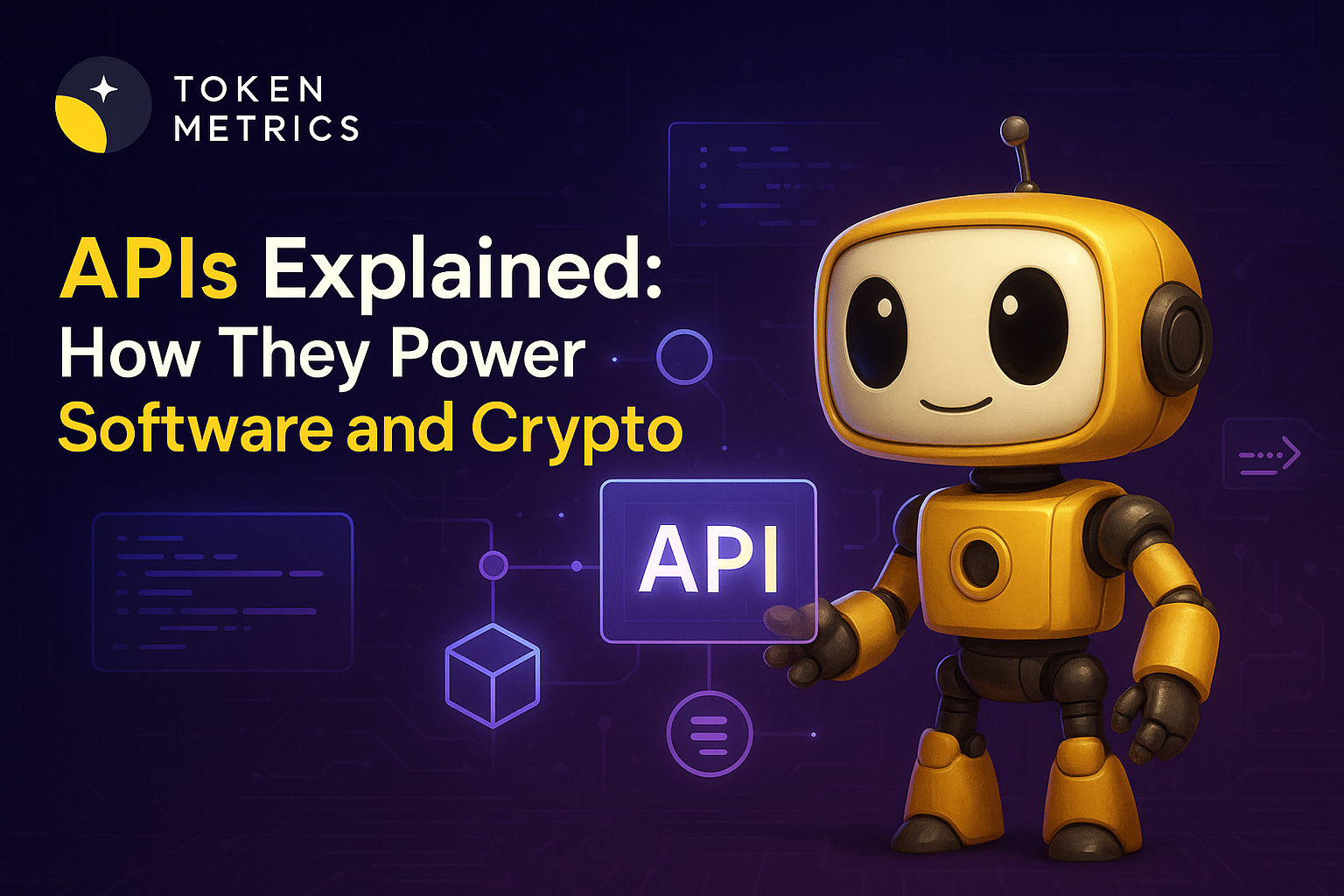
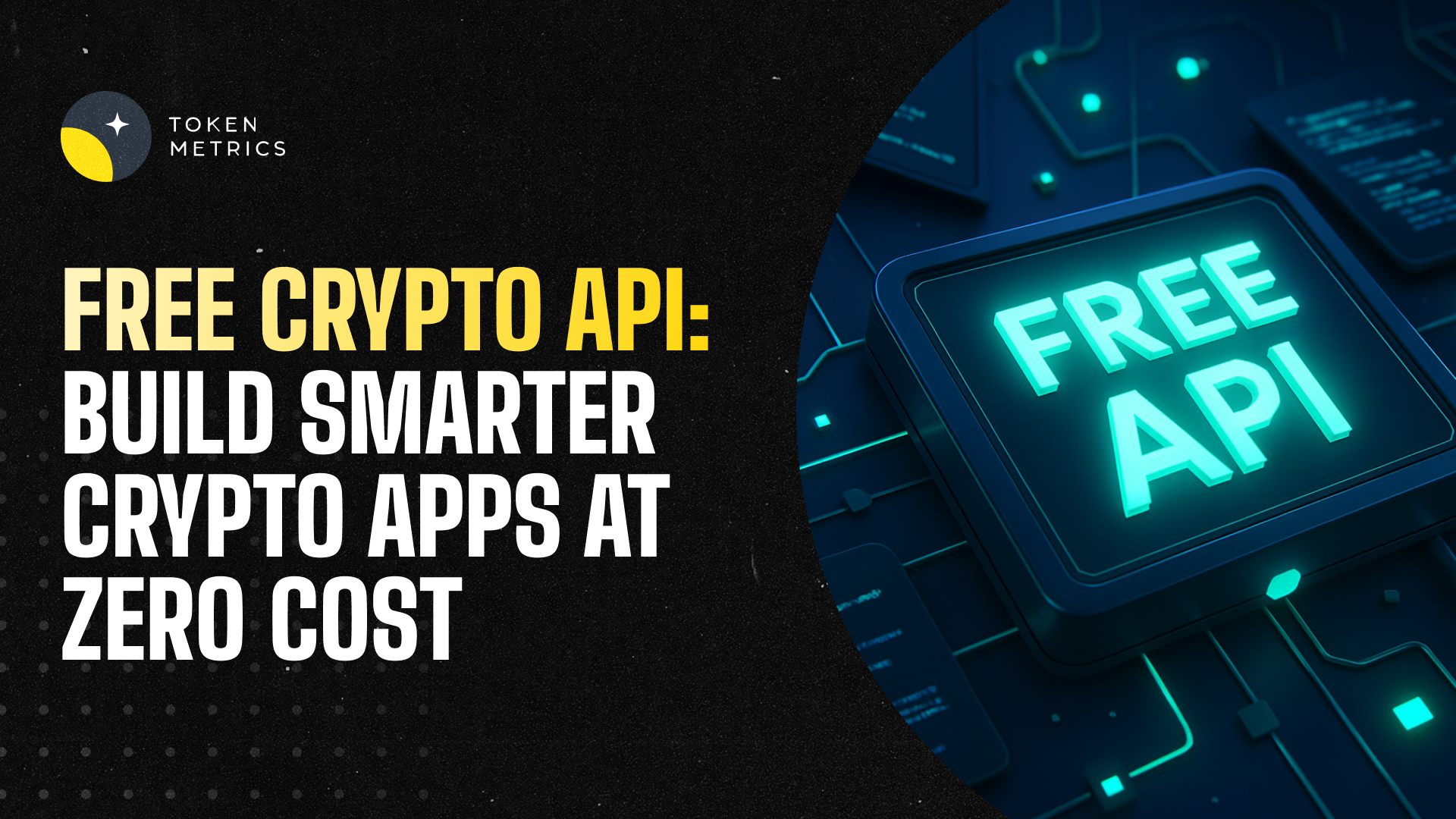
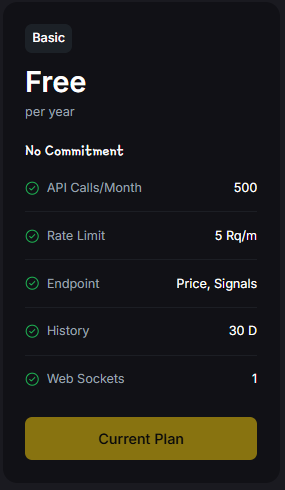
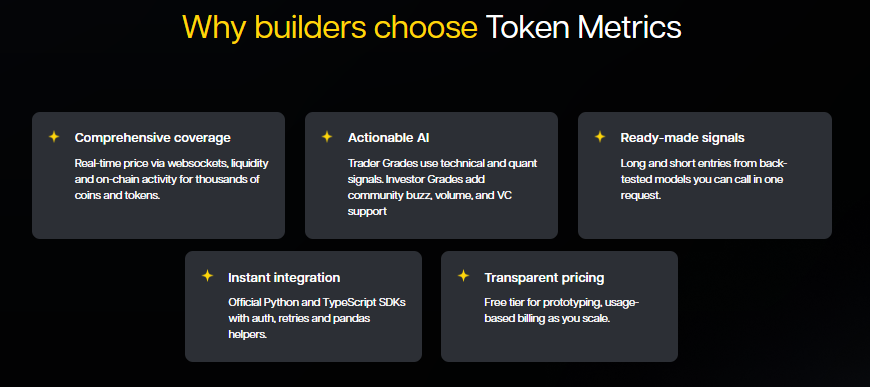
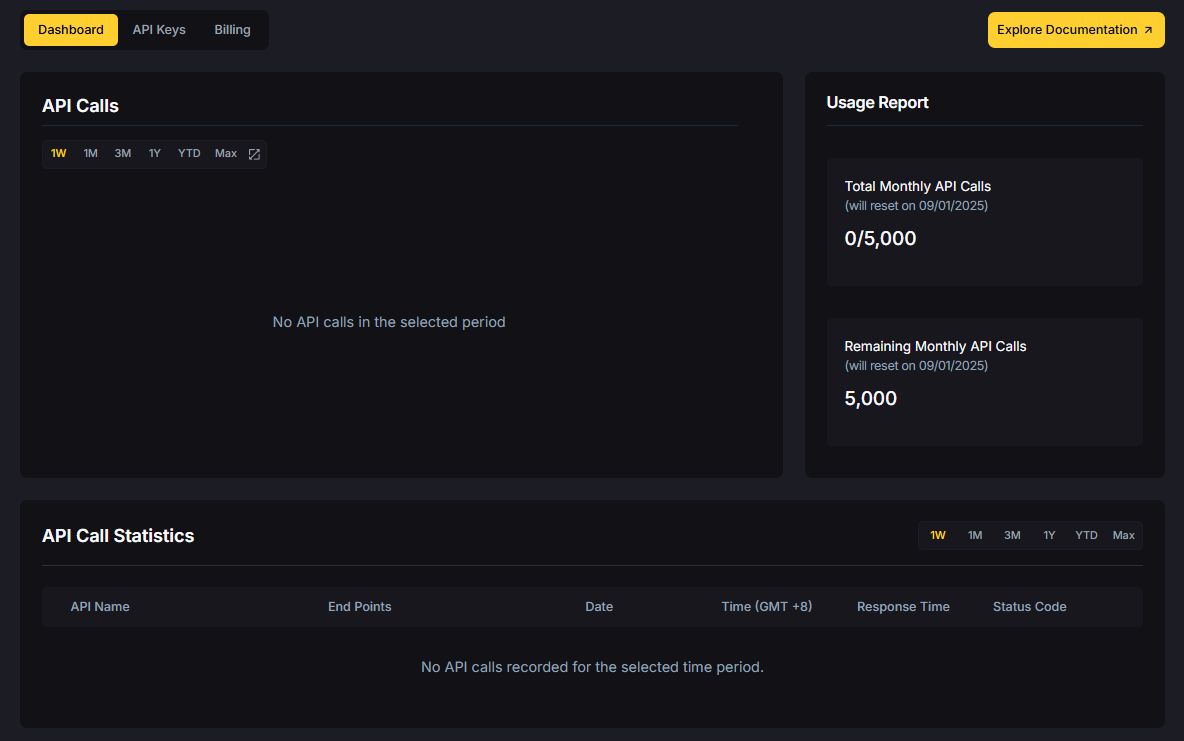



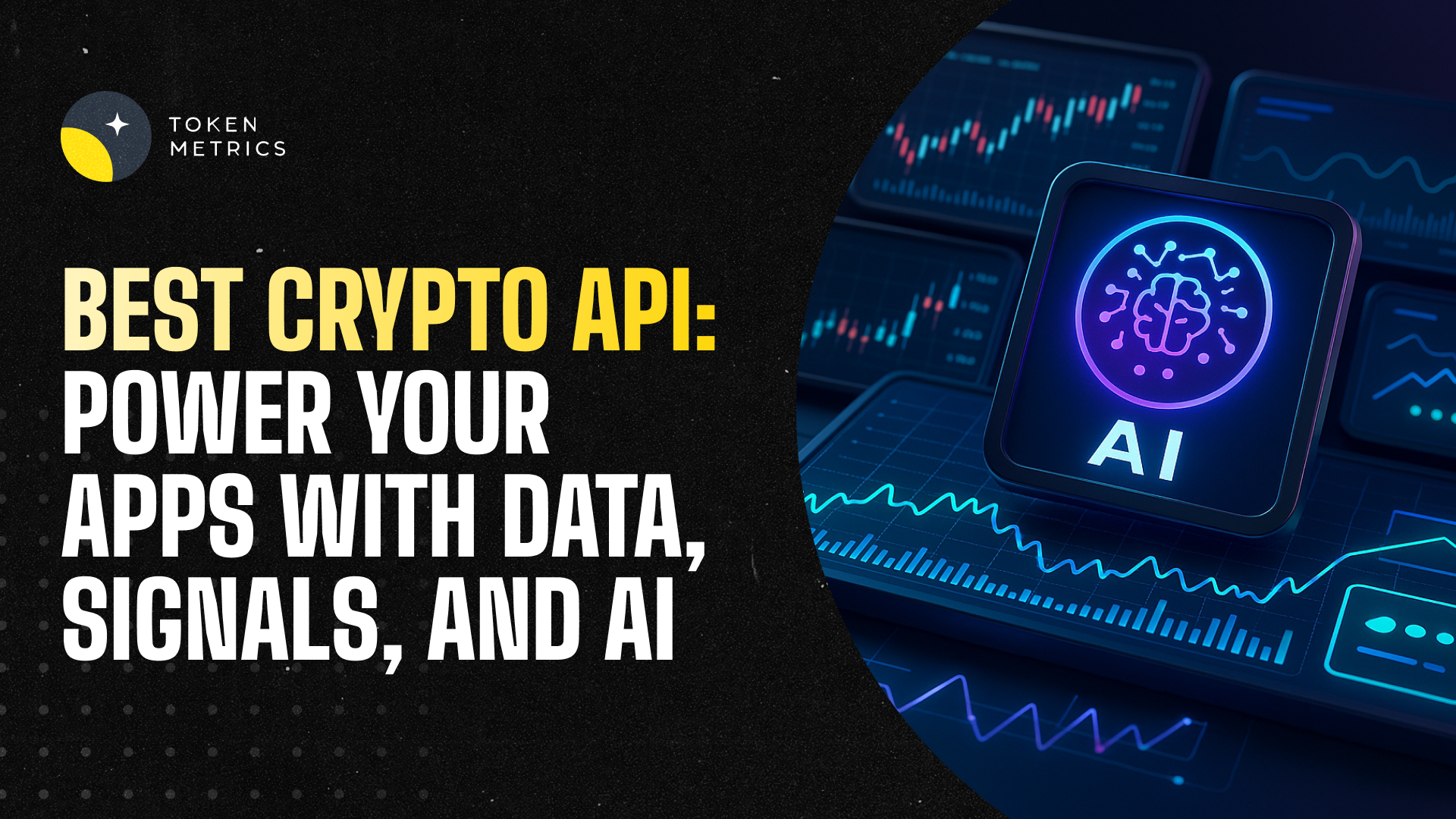


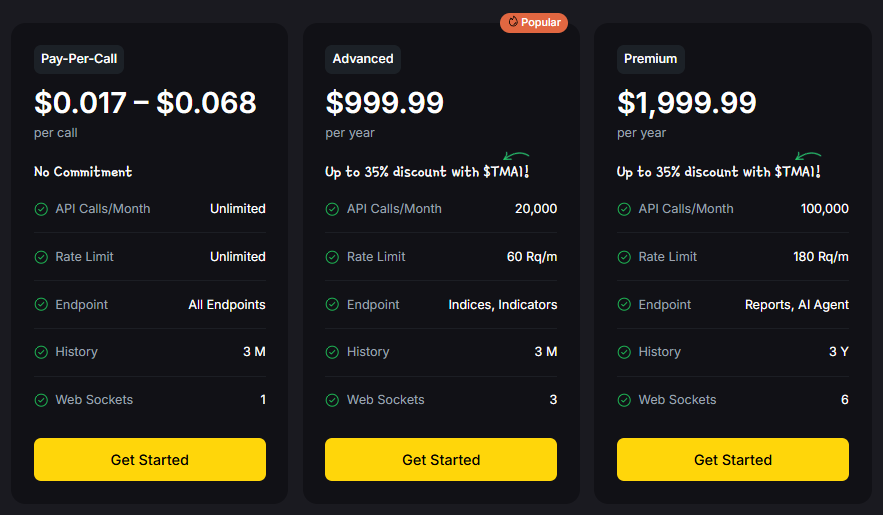




.svg)




.png)